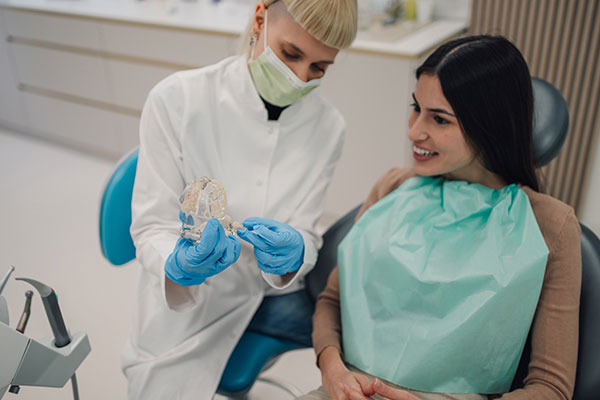Can Teeth Be Sensitive After Teeth Whitening?

Professional teeth whitening is a safe and effective way to remove stubborn stains and improve the appearance of your smile. However, it can cause a temporary side effect called dentinal hypersensitivity. This can cause your teeth to react with discomfort to foods that are acidic, sweet, or sour or to temperatures of hot and cold.
Dentinal hypersensitivity from whitening is usually temporary and resolves after a few days. In the meantime, there are things you can do to help keep it under control.
What causes sensitivity after teeth whitening?
Each tooth contains microscopic channels that start at the surface of the enamel and extend down to the nerves at the center of the tooth. These channels are called dentinal tubules. The reason that teeth whitening agents work so well is because they can penetrate deep down into the enamel. As a result, they sometimes get into the dentinal tubules and irritate the nerves within the tooth.
This is the most common cause of sensitivity from teeth whitening. It can also occur because of irritation of your gums when the bleaching gels come in contact with them. If your dentist uses whitening trays that you bite down into, teeth may become sensitive due to the pressure exerted on them during the whitening process.
What can you do about sensitivity from teeth whitening?
There are things that you can do before the treatment to help reduce sensitivity. If you still experience symptoms following the treatment, there are things you can do to lessen those symptoms.
What to do before treatment
Starting a week to 10 days prior to your appointment, you can brush your teeth with a desensitizing toothpaste. This has ingredients that help to block pain signals at the surface of the tooth from reaching the nerves at the center. It may also cover up the tubules, blocking the bleaching agents from reaching the nerves.
Just prior to treatment, you can apply a desensitizing gel to your teeth. Follow the directions provided on the package for applying the gel and then rinsing it off with water.
What to do after treatment
You can continue to use toothpaste for sensitive teeth for brushing after your whitening treatment. Be sure to use a soft-bristle brush to avoid any damage to the enamel. Fluoride is a mineral that helps to build up tooth enamel, so use dental hygiene products that include it to help to build your teeth back up more quickly after whitening. Use lukewarm water rather than cold to brush your teeth and rinse your mouth.
For the first few days after teeth whitening, choose foods and drinks that you can enjoy at room temperature and avoid any foods that are too sugary or acidic. If this is not possible, you can prevent potentially irritating beverages from reaching your teeth by sipping them through a straw.
Conclusion
It is normal to experience some sensitivity following teeth whitening. This is temporary and usually goes away within a few days. You can try desensitizing toothpaste prior to treatment to try to prevent the sensitivity, and there are several steps you can take after the treatment to reduce the symptoms until they resolve completely.
Request an appointment here: https://thechesterfielddentist.com or call Chesterfield Dentist at (804) 412-0867 for an appointment in our Chester office.
Check out what others are saying about our dental services on Yelp: Teeth Whitening in Chester, VA.
Recent Posts
Minor to moderate teeth stains can be removed with professional teeth whitening. However, to achieve ideal results, there are certain things to avoid after treatment, such as foods and drinks that can cause stains. The following overview discusses five things you should avoid to keep your smile bright after teeth whitening treatment.You can reduce the…
Teeth whitening involves the application of a whitening agent to brighten your smile. Before the procedure, there are some things you can do to help you properly prepare for treatment. This review discusses how you can prepare before a teeth whitening treatment to ensure the safest and most effective results.Every patient will have a unique…
Professional teeth whitening treatments are monitored by dental professionals, ensuring the procedure is as safe as it can possibly be. While there are some potential side effects, most patients do not experience any notable discomfort or harmful side effects after professional teeth whitening from a licensed dentist.There are different types of teeth whitening. There are…
Tooth decay and teeth whitening treatments simply do not mix. The bleaching agents used for the treatment weaken enamel. That can lead to discomfort and damage to teeth structures if the patient has existing issues like cavities. If the patient’s teeth are healthy, the procedure only leads to temporary increased teeth sensitivity that should go…


